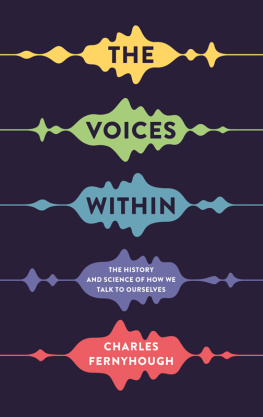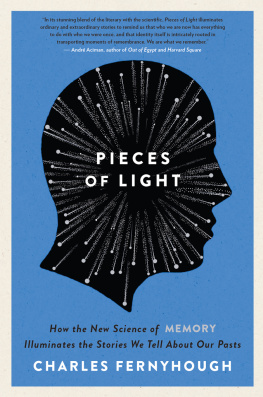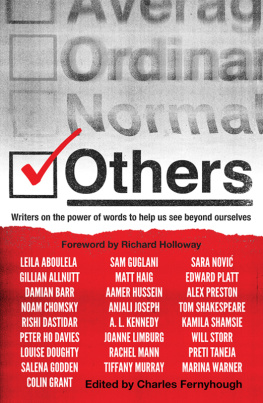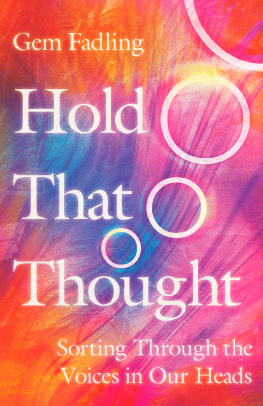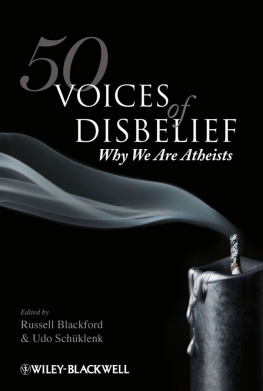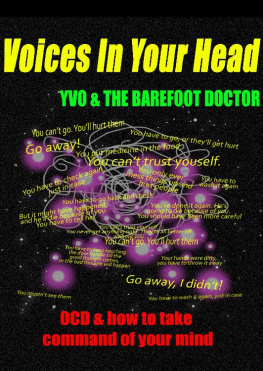THE VOICES WITHIN
CHARLES FERNYHOUGH is the author of Pieces of Light (Profile Books), The Baby in the Mirror (Granta) and the novels The Auctioneer (Fourth Estate) and A Box of Birds (Unbound). He has contributed to the Guardian, Nature, Financial Times, New Scientist and BBC Focus. He has published many scientific articles on the relation between language and thought, and his ideas on thinking as a dialogue with the self have been influential in several fields. He is a part-time professor in psychology at Durham University, where he directs Hearing the Voice, a project on inner voices.
ALSO BY CHARLES FERNYHOUGH
NON-FICTION
Pieces of Light
The Baby in the Mirror
FICTION
A Box of Birds
The Auctioneer
THE VOICES WITHIN
THE HISTORY AND SCIENCE OF HOW WE TALK TO OURSELVES
CHARLES FERNYHOUGH

First published in Great Britain in 2016 by
PROFILE BOOKS LTD
3 Holford Yard
Bevin Way
London WC1X 9HD
www.profilebooks.com
Published in association with

183 Euston Road
London NW1 2BE
www.wellcomecollection.org
Wellcome Collection is the free visitor destination for the incurably curious. It explores the connections between medicine, life and art in the past, present and future. Wellcome Collection is part of the Wellcome Trust, a global charitable foundation dedicated to improving health by supporting bright minds in science, the humanities and social sciences, and public engagement.
Copyright Charles Fernyhough, 2016
The moral right of the author has been asserted.
All rights reserved. Without limiting the rights under copyright reserved above, no part of this publication may be reproduced, stored or introduced into a retrieval system, or transmitted, in any form or by any means (electronic, mechanical, photocopying, recording or otherwise), without the prior written permission of both the copyright owner and the publisher of this book.
A CIP catalogue record for this book is available from the British Library.
eISBN 978 1 78283 078 8
For Jim Russell
We think not in words but in shadows of words
Vladimir Nabokov
FUNNY SLICES OF CHEESE
It is an autumn day in West London. I am on a Central Line train on my way to a lunch meeting. The midday rush has not yet started, and I have managed to find a seat in one of those carriages where you sit in two facing rows, close enough to skim the front page of whatever newspaper is being read opposite you. The train has stopped between stations and we are waiting for an announcement. People are reading paperback novels, the junk newspapers, those strange technology manuals which you only ever see being studied on the Underground. The rest of us are staring at the obscurely colour-coded pipes that vein the tunnel just outside the carriage window. Holland Park is probably still a quarter of a mile away. I am not doing anything unusual; in fact, I am not doing anything at all. It is a moment of faintly self-conscious peacefulness. I am an ordinary man on the wrong side of forty, in sound mental and physical health. I have had slightly too much sleep, slightly too little food, and I am looking forward to lunch in Notting Hill with a pleasant sense of appetites not yet satisfied.
Suddenly I burst out laughing. A moment ago I was an anonymous Oyster-validated passenger; now I am blowing my cover with a more-than-audible snigger. I am a frequent visitor to the capital, but I am not used to having so many strangers looking at me at the same time. I have enough presence of mind, and consciousness of my audience, to rein in my laughter before a private joke turns into a public embarrassment. It is not what I am laughing about that is interesting, so much as the fact that I am laughing at all. I have not gatecrashed someone elses joke or overheard a funny snippet of conversation; I have done something much more mundane. You could say that I have just had the most ordinary experience that a person can have on a Tube train. I have had a thought.
It was a pretty unremarkable thought that set off my laughter that day. This wasnt one of those moments when a thinker finally divines the solution to an important problem, gives birth to an idea that will revolutionise her industry, or finesses the opening lines of his greatest poem. Thoughts can make history, but they usually dont. At that moment between Underground stations, I was thinking of a short story I had been working on. It was a rural tale of community and post-agricultural disharmony, and I wanted my ex-farmer hero to have an extramarital liaison. I had been turning over the possibilities of him having an affair with the woman who drove the mobile post office, consummated behind the closed shutters of a specially equipped Ford Transit. They would meet on Thursday afternoons, after the weekly hours business in the village. The door would be locked, the two-way radio switched off, and they would discover each other on the counter scuffed by hundreds of small-change transactions. As I constructed the scene in my minds eye, I had an image of a bright red Post Office van parked on a country lane, closed down and silent to all who might pass by, then beginning to rock, with an insistent squeak of suspension springs, as the bodies inside began to seek friction
It was at this point that I laughed out loud. These words came into my head, and they amused me. They didnt have that effect on anyone else, because no one else had heard the punchline. But my fellow passengers knew that there was a punchline. They didnt laugh at my private joke (because they couldnt hear it), but they also didnt laugh at me for laughing. They understood that I, like most of the people in that Tube carriage, was busy with thoughts, and they knew that thoughts wild thoughts, mundane thoughts, musings sacred or profane can occasionally provoke laughter. Talking to yourself in your head is an ordinary activity, and regular folk recognise it when they see it. Not only that, but they also recognise its private qualities. Your thoughts are your own, and whatever happens there takes place in a realm to which other people are not admitted.
I never fail to be amazed by this quality of consciousness. Not only is our experience compelling and vivid for ourselves, it is so only for ourselves. In the second or two following my outburst, I realised that I was trying to send out social signals to excuse my behaviour. You dont laugh out loud in front of a nearly-full train compartment without feeling at least some faint embarrassment. I didnt want to pretend that my laughter hadnt happened, perhaps by trying to cover it up with a coughing fit, but I was still concerned to put out certain messages: that I was not mad; that I was quickly back in control; indeed, that it was already over the moment of hilarity had now passed. I found myself concocting an expression that was something like a smile, mixing knowingness, complicity and embarrassment. Another thought arose to accompany it, a voice in my head that said, They cant think Im laughing at them, can they? Laughter is a social signal, but this joke had been a private one. I had broken one of the rules of human interaction, and I needed to make some statement to acknowledge this fact.
I neednt have bothered. The other people in the carriage, unless they were small children, Venusians or certain kinds of psychiatric patients, would have understood. So strong is our conviction about the privacy of our inner experience that its alternatives mind-reading, telepathy and thought invasion can be sources of humour or horror. Strangers on a train will quickly recognise the ramifications of this feature of thinking; they will, after all, have had similar experiences themselves. I had just had a striking reminder of my thoughts privacy, at the same time as I was made powerfully conscious of their immediacy
Next page
